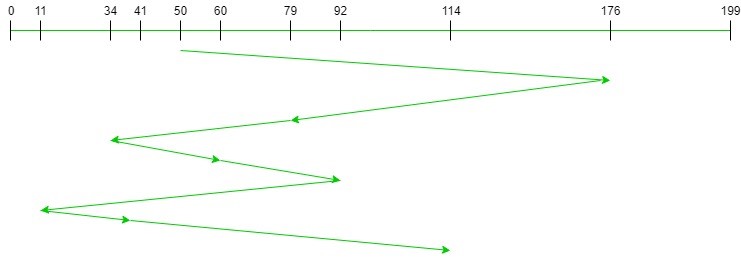FCFS: First Come First Serve
FCFS (First Come First Serve) is simplest disk scheduling algorithm. Each requests are taken/executed in the sequence of their arrival in the disk queue. As a result, there is no starvation in this algorithm. However, it isn't fast compared to other algorithms.
Advantages:
- There is no starvation in FCFS.
- FCFS is simple and straight forward approach which means there are no indefinite delays.
- In FCFS, fair chance given to each request.
Disadvantages:
- FCFS isn't considered an efficient and optimized approach.
- FCFS can be time consuming.
Example:
- Suppose a disk contains 200 tracks (0-199) and the request queue contains track no: 176, 79, 34, 60, 92, 11, 41, 114.
- The current position of the read/write head is 50. Now we have to calculate the total number of track movements of read/write head using FCFS scheduling.
- As mentioned in the following example, the disk contains 200 tracks, so we take a track line between 0 to 199.
- The current position of the read/write head is 50. So, we start from 50, then move read/write head in the FCFS order. When all the requests are addressed, then we calculate a total number of cylinders moved by the head.
- Total Number of cylinders moved by the head = (176-50)+(176-79)+(79-34)+(60-34)+(92-60)+(92-11)+(41-11)+(114-41) = 510

Steps to Implement Algorithm:
- Let Request array represents an array storing indexes of tracks that have been requested in ascending order of their time of arrival. 'head' is the position of disk head.
- Let us one by one take the tracks in default order and calculate the absolute distance of the track from the head.
- Increment the total seek count with this distance.
- Currently serviced track position now becomes the new head position.
- Go to step 2 until all tracks in request array have not been serviced.
Time Complexity: O ( N ) Auxiliary Space: O ( N )
Simulate